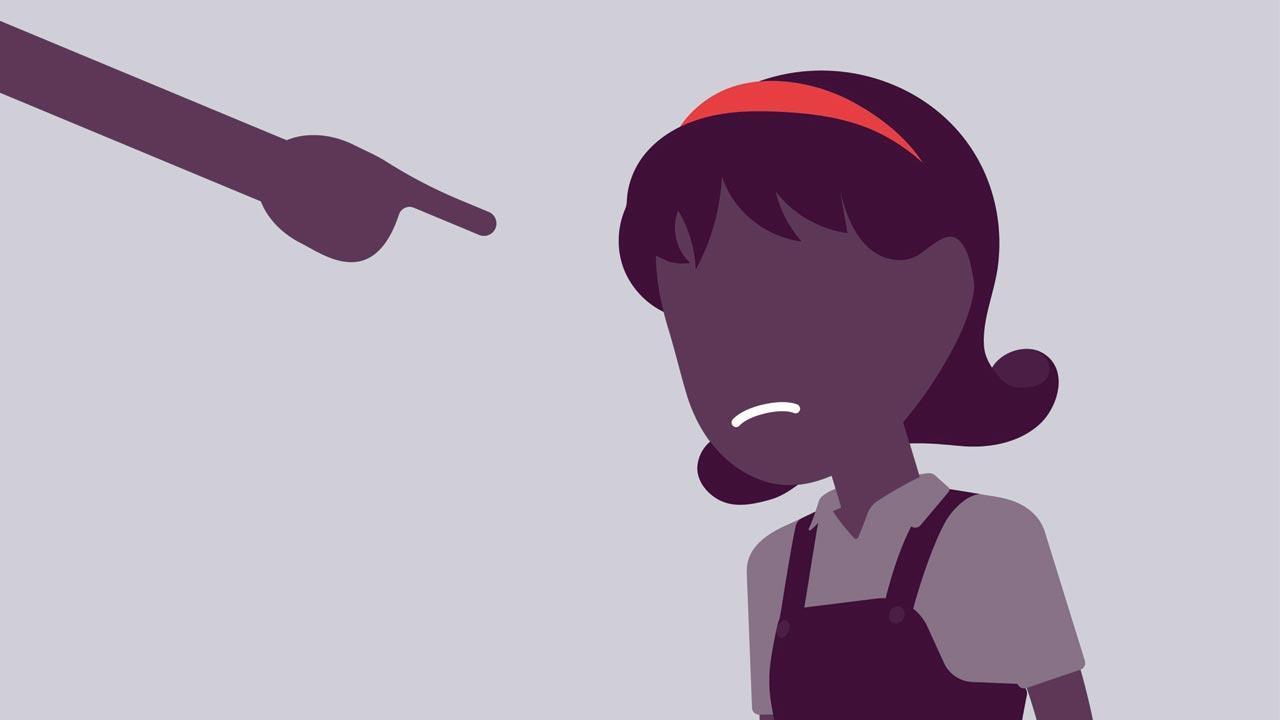In a culture which deifies parents and treats their word as law, seeing them as flawed and even broken human beings is not common. But that’s changing

Pic/Istock
At the peak of the first COVID-induced lockdown, Shubhra Singh put out a plea on Instagram: She could draw an illustration for you for Rs 1,000-Rs 1,500 a piece. The 19-year-old wanted to study Psychology, which her father refused to pay for. The fee was R6,880, and she was keen to exit a toxic home environment.
“I’ve wanted to run away from home since I was in school,” says the Delhi-resident. “My dad has an unhealthy attachment to me. He would shame, isolate and manipulate me while my mother simply watched. The only thing she would say is, ‘Be a girl, be obedient. Your father knows best.”
By 16, Singh had begun cutting her wrists to get her parents’ sympathy. It didn’t work. Then something changed in April 2020. She fell in love with a boy who pointed out that her living situation was not normal and encouraged her to opt for therapy. She was diagnosed with Borderline Personality Disorder caused by a deeply traumatic childhood. Its main definers are a deep sense of abandonment and impulsivity. She also recognised that her father was a narcissist.
“He couldn’t realise his dream of becoming an IAS officer, and wanted me to pursue the same,” says Singh, who goes by the handle Femitoonist on Instagram and Twitter. “I wanted to explore my options, like any other teenager.”
Though our culture says so, parents are not infallible, and sometimes the best thing to do is to distance. Zirak Marker, a child, adolescent and family psychiatrist and psychotherapist says, “One in three or four of my clients have a toxic family member. Ninety per cent of children battling anxiety have toxic parents.”
And these children are flying the coop earlier and asserting autonomy to the point of cutting off their parents, or laying down non-negotiable boundaries at the very least.
“In the last few years,” says Dr Alpes Panchal, a psychiatrist and de-addiction specialist, “more and more teens and young adults are creating space between them and their parents. In India, we are held back by the thought, ‘What will everyone say?’ ‘Will I be accepted by the rest of the family or peers’ because we are raised to be respectful and dutiful.”
 Delhi-based illustrator Shubhra Singh, 21, left home with just the clothes on her back and now works in customer service at Wipro to pay for rent and therapy. She says, “My dad has an unhealthy attachment to me. He would shame, isolate and manipulate me while my mother simply watched.”
Delhi-based illustrator Shubhra Singh, 21, left home with just the clothes on her back and now works in customer service at Wipro to pay for rent and therapy. She says, “My dad has an unhealthy attachment to me. He would shame, isolate and manipulate me while my mother simply watched.”
There’s a profile to the toxic parent. “They are usually narcissistic, impulsive, judgmental, ego-centric and self-centric,” says Marker. “They are highly reactive and critical; everything is an existential crisis, catastrophic. They have unrealistic expectations of their children, and constantly focus on the negatives. They are unforgiving. ‘We will never forget..,’ they say. They control their children using guilt and shame, and lack the ability to put the child first.”
Samindara Sawant, a psychologist and psychotherapist, has a succinct way of putting it. “A good parent recognises that they are there for the children, and not vice versa. They don’t expect their emotional needs to be met by their children,” she says, “There is conflict in every family, but in a toxic unit, there is a violation of boundaries, and autonomy is not encouraged.” She too observes that the younger generation is able to recognise this dysfunction and voice it better due to awareness about mental health.
A child with toxic parents usually has low self-concept, according to Marker. “They have very poor solution-finding and decision-making skills. They lean on unhealthy and addictive coping mechanisms. They are bad at maintaining relationships due to blunted emotional intelligence and resilience. They have adjustment disorders,” agrees Panchal, who is also the co-founder of The Freemind Initiative. “They can’t cope with life situations. Any change will drive them to sleeplessness and anxiety, which can progress to depression and OCDs.” A pet professional we spoke to says she dissolves into anxiety whenever she comes home. “Messy environments make me anxious and I have to clean up. It’s an OCD. My parents are messy people, so slowly, home to me has become my room. I only get out to use the bathroom or kitchen,” says the 25-year-old SoBo resident. She faced mental, emotional and physical abuse through childhood. She realised this was out of the ordinary when she remembered an incident that took place when she was five years old. “I was staying with my grandparents and wet the bed at night, something I was prone to,” she says, “As my grandmother was changing me, my grandfather saw marks all over the back of my body. They made me tell them how I got them and were livid. They called my parents up in the middle of the night to fire them. What could a five-year-old do to deserve a beating? When I got home, my parents punished me again.”
_e.jpg)
Shubhra Singh
Toxic parents rely on secrecy, and are very concerned about their reputation. “I was always told never to talk about things that went on in our home,” says the dog trainer. A media professional was told to keep an even graver secret. “When I was 13, my birth parent [she can’t bear to call her ‘mother’] had an affair and forced me to lie about it to the family,” says the middle-aged person. “She said they would judge her harshly because she is a woman, while men do it all the time. She said if I helped her, it would mean I was mature. I saw right through her, but I kept my mouth shut because who would believe a 13-year-old hormonal teenager, who had recently lost her biological father?”
“Whenever someone is home,” says the pet professional, “my mother sweetly asks how my day was as soon as I walk in. If friends are over, they go out of their way to be the perfect parents.” Though estranged, Singh’s parents get in touch with her whenever she posts something controversial (in the familial sense) on social media. “Once, they came over after one such post. I had just cut my wrists,” says the 21-year-old, “My friends were also over and my parents felt the need to convince them that I was an ungrateful child who was causing them grief. They didn’t even notice the blood on the floor.”
The children of toxic parents could have a great need to please their parents, but the opposite is also possible with someone with a healthy self-concept.
 Zirak Marker, child, adolescent and family psychiatrist and psychotherapist; (right) Samindara Sawant, psychologist and psychotherapist
Zirak Marker, child, adolescent and family psychiatrist and psychotherapist; (right) Samindara Sawant, psychologist and psychotherapist
A journalist-turned-social work student distanced herself from her parent organically. “The relationship between my mother and I turned acrimonious when I was a teenager and coming into my own,” says the 29-year-old, “She sought to control my behaviour, choices [relationship and career-related] and my expression. I managed to get my way in most aspects but only after bitter disagreements and fights. My studies and career took me further away from my mother. A much-subdued version of the tug-of-war continues even today, and we have a relationship of convenience.”
Some, like the media professional and social worker (“I realised she was manipulative when I was just 10”), are prescient about their situation. For others, it takes slow exposure to the outside world to think something is off.
“My job requires me to go into people’s homes,” says the pet professional, “There I saw different kinds of relationships, very unlike my own. Once I was having dinner at my best friend’s house and her parents said something like: We work hard and will continue to work hard so that you both [my friend and her brother] get the best. I welled up and ran to the bathroom to cry. I didn’t even realise why I was crying.”
It took a few more years for her to realise her parents were not offering stability, security, safety and unconditional support in all aspects—financial, mental and emotional.
These young adults tend to have difficult relationships, unless they consciously work to correct their pattern. “You don’t know how to love,” says Singh. “You settle for the bare minimum or a ‘familiar’ kind of love because that is the only one you know. When you are on your own, you seek love everywhere. You want to create a family.”
This is a predicament the pet professional knows too well. “I was dating this guy who had the most wonderful parents. They were so good to me that I put up with their son’s sh**. In fact, they would tell me to do better than their son!” she says. She also dated a person who was the male version of her mother—angry, abusive and prone to gas lighting.
Shame and blocking financial independence are the commonest means parents use to control their children; and ironically the children pursue financial independence first in a bid to be free.
“My toxic parent, on whom I was financially dependent at the time, refused to let me study for a profession of my choice,” says the media professional. “That’s when I first felt the need to step away. I finally left home within months of completing graduation and getting a full time job.”
Once she built a kitty after selling her art, Singh told her parents she would be leaving on a certain date. “When that date arrived, I got up and got ready,” she says, “and all hell broke loose. My brother locked up my room and would not allow me to take my things. He laughed hysterically when I pleaded to be allowed to take my clothes.
My mother wept and my father was indifferent. Finally, I left with just the clothes on my back, and an earring box that was in the living room. I stayed with my then-partner’s best friend for a few days, and then with friends.” Singh now works in customer service at Wipro to be able to pursue a Masters degree and “afford years of therapy”.
The pet professional still lives with her parents, but does not rely on them. “I started working early to have my own money. It makes me very, very happy,” she says.
Slut shaming is also a preferred weapon of destruction. “After my first break-up at 19, I slipped into depression,” says the SoBo resident, “my parents took care of me, but after that, whenever I did not do something my mother wanted me to, she would say, “No wonder he [the ex-boyfriend] left you. You must have been sleeping around…”
The media professional’s mother both shamed and encouraged sexual behaviour. “She would insist I wear push-up bras at age 12, and while fixing the straps insinuate that I was making myself pretty for boys,” she says.
The straw that broke Singh’s back was sexual in nature too. “I used my father’s laptop and forgot to log out,” she says. “He read every email I have ever received or written, and then stormed out and began shaming me. ‘How many boys have you slept with? How many times have you slept with this one…’ he said. That’s when I seriously started to think about moving out to protect my personhood.”
Separating from your parents, grounding yourself in your life goals and setting healthy boundaries are what all mental health professionals prescribe.
“We teach them to recognise their triggers and learn to politely disengage when they come up,” says Marker. “After you assert your boundaries two to three times, the parents get it.”
“You get to choose how involved your parents get to be in your life decisions,” says Sawant. “You can hear them out, but do what you think is best. You can keep communication superficial and transactional, and steer away from emotional minefields. Recognise what you can do as duty [a phone-call every few days] so that you don’t feel pressured [if your parents want you to call several times a day]. Ground yourself in what you want from life, and build a support system that gives you what you want.”
“A psychiatrist friend, Dr Jai Mehar Singh is like a father figure to me. My closest friends—Anamaya Jamwal and Shriya Poddar—are my family. My partner and I just broke up, but he was with me through this whole journey,” says Singh.
The media professional has cut their mother from their lives, while the pet professional and social worker have found a working solution. “My parents and I barely speak. I work all day and animals are my solace,” say the dog trainer. “My clients validate me effusively. I still have to live with my parents, but I don’t rely on them. I don’t expect there will be food for me when I come home. Every time they refuse to do something, I figure out how to do it myself.”
The win, say mental health professionals, is when you are devoted to changing this inter-generational pattern. “I think there are two kinds of parents. Ones who have the ‘Yahoo!’ moment and recognise they are being just like their parents, and change. They go to make amends and become great grandparents even. The other kind lacks self-awareness.”
Sawant says growth is understanding your parents are trying to resolve their own traumas, and not expecting them to understand you. “Cutting off from the mother has a great emotional impact. You must think about how you will feel when they die. There can be a sense of unfinished business, guilt and lack of closure which may need years of therapy.”
All four of the subjects we spoke to recognise that their parents are not intentionally cruel and are living out their generational trauma. However, they are determined that it ends there, and they will not carry it further.
“You may think you can’t live on your own, or the world is hostile,” says Singh while parting, “But believe me, there are people to help you! Someone offered me a
fridge just like that when I was setting up home. If I—an introverted, anxious, depressed person—can do it, so can you. Choosing your way to live leaves no regrets.”
 Subscribe today by clicking the link and stay updated with the latest news!" Click here!
Subscribe today by clicking the link and stay updated with the latest news!" Click here!








